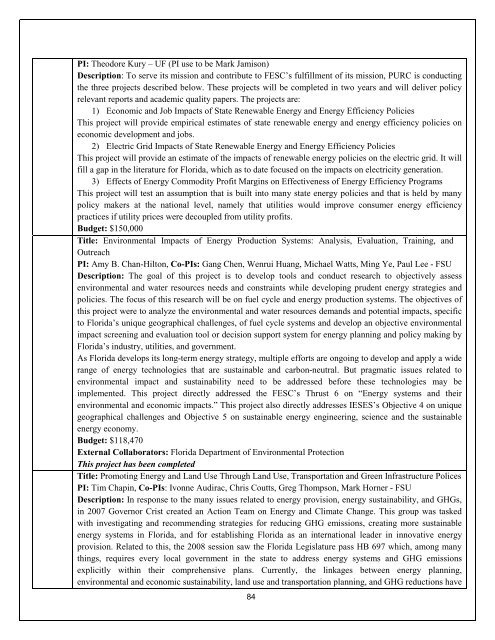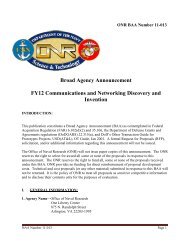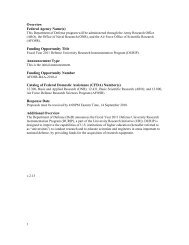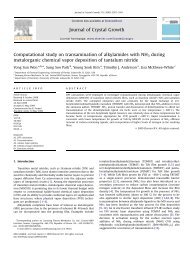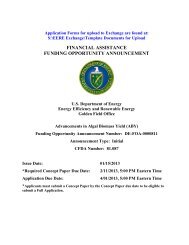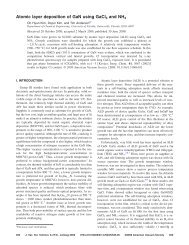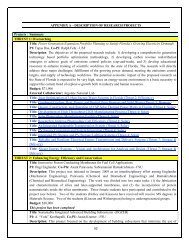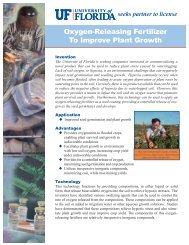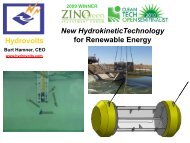Annual Report- Part III - Florida Energy Systems Consortium
Annual Report- Part III - Florida Energy Systems Consortium
Annual Report- Part III - Florida Energy Systems Consortium
Create successful ePaper yourself
Turn your PDF publications into a flip-book with our unique Google optimized e-Paper software.
PI: Theodore Kury – UF (PI use to be Mark Jamison)Description: To serve its mission and contribute to FESC’s fulfillment of its mission, PURC is conductingthe three projects described below. These projects will be completed in two years and will deliver policyrelevant reports and academic quality papers. The projects are:1) Economic and Job Impacts of State Renewable <strong>Energy</strong> and <strong>Energy</strong> Efficiency PoliciesThis project will provide empirical estimates of state renewable energy and energy efficiency policies oneconomic development and jobs.2) Electric Grid Impacts of State Renewable <strong>Energy</strong> and <strong>Energy</strong> Efficiency PoliciesThis project will provide an estimate of the impacts of renewable energy policies on the electric grid. It willfill a gap in the literature for <strong>Florida</strong>, which as to date focused on the impacts on electricity generation.3) Effects of <strong>Energy</strong> Commodity Profit Margins on Effectiveness of <strong>Energy</strong> Efficiency ProgramsThis project will test an assumption that is built into many state energy policies and that is held by manypolicy makers at the national level, namely that utilities would improve consumer energy efficiencypractices if utility prices were decoupled from utility profits.Budget: $150,000Title: Environmental Impacts of <strong>Energy</strong> Production <strong>Systems</strong>: Analysis, Evaluation, Training, andOutreachPI: Amy B. Chan-Hilton, Co-PIs: Gang Chen, Wenrui Huang, Michael Watts, Ming Ye, Paul Lee - FSUDescription: The goal of this project is to develop tools and conduct research to objectively assessenvironmental and water resources needs and constraints while developing prudent energy strategies andpolicies. The focus of this research will be on fuel cycle and energy production systems. The objectives ofthis project were to analyze the environmental and water resources demands and potential impacts, specificto <strong>Florida</strong>’s unique geographical challenges, of fuel cycle systems and develop an objective environmentalimpact screening and evaluation tool or decision support system for energy planning and policy making by<strong>Florida</strong>’s industry, utilities, and government.As <strong>Florida</strong> develops its long-term energy strategy, multiple efforts are ongoing to develop and apply a widerange of energy technologies that are sustainable and carbon-neutral. But pragmatic issues related toenvironmental impact and sustainability need to be addressed before these technologies may beimplemented. This project directly addressed the FESC’s Thrust 6 on “<strong>Energy</strong> systems and theirenvironmental and economic impacts.” This project also directly addresses IESES’s Objective 4 on uniquegeographical challenges and Objective 5 on sustainable energy engineering, science and the sustainableenergy economy.Budget: $118,470External Collaborators: <strong>Florida</strong> Department of Environmental ProtectionThis project has been completedTitle: Promoting <strong>Energy</strong> and Land Use Through Land Use, Transportation and Green Infrastructure PolicesPI: Tim Chapin, Co-PIs: Ivonne Audirac, Chris Coutts, Greg Thompson, Mark Horner - FSUDescription: In response to the many issues related to energy provision, energy sustainability, and GHGs,in 2007 Governor Crist created an Action Team on <strong>Energy</strong> and Climate Change. This group was taskedwith investigating and recommending strategies for reducing GHG emissions, creating more sustainableenergy systems in <strong>Florida</strong>, and for establishing <strong>Florida</strong> as an international leader in innovative energyprovision. Related to this, the 2008 session saw the <strong>Florida</strong> Legislature pass HB 697 which, among manythings, requires every local government in the state to address energy systems and GHG emissionsexplicitly within their comprehensive plans. Currently, the linkages between energy planning,environmental and economic sustainability, land use and transportation planning, and GHG reductions have84


